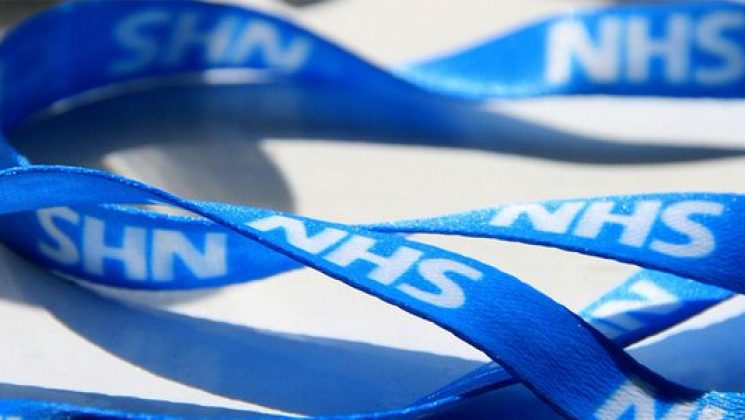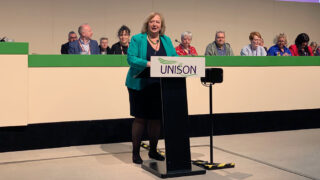Over a million hospital porters, 999 call handlers, healthcare assistants, nurses, midwives and other NHS staff across England are being offered long overdue pay rises of between 6.5% and 29% over the next three years, say health unions today (Wednesday).
Under the proposed agreement – reached after months of negotiation between the unions, NHS employers and the government – hospital caterers, cleaners, porters and other staff on the lowest pay grade would get an immediate pay rise of over £2,000 this year (an increase of between 11% and 13%).
This would mean that from 1 April every NHS worker in England is to be paid at least £8.93 an hour, which is 18p above the real living wage of £8.75. This would take the lowest full-time rate of pay in the NHS to £17,460.
Under the proposals, band one would be scrapped by April 2021 and all staff moved to the next pay scale. The lowest salary in the NHS would then be £18,005. Over the three years, more than 100,000 of the lowest paid health workers would be in line for wage increases of between 15% (£2,300) and 17% (£2,600).
Other NHS staff would receive between 9% and 29% over the three years. Proposed changes to the existing pay structure would see most staff moving to the top of their pay band more quickly. It would also result in an end to overlaps, which have seen some employees on lower bands earning more than more senior colleagues the next level up.
For health workers already at the top of their band, most would get 6.5% between April 2018 and April 2020. All but the very highest paid staff would get 3% in April 2018, 1.7% and a 1.1% lump sum in April 2019, and 1.7% from April 2020.
Additional funding of £4.2bn agreed by the Treasury means the increase in the NHS pay bill over the three years won’t have to come from existing budgets.
Commenting on the proposed agreement, UNISON head of health and lead pay negotiator for the NHS unions Sara Gorton said: “Seven years of pay freezes and wage increases well below the cost of living have meant significant financial hardship for health staff and their families. It’s also created headaches for employers as they struggled to attract new recruits and hold onto experienced staff.
“The agreement means an end at last to the government’s self-defeating and unfair one per cent pay cap. It won’t solve every problem in the NHS, but would go a long way towards making dedicated health staff feel more valued, lift flagging morale, and help turn the tide on employers’ staffing problems.
“If health workers accept the offer, everyone’s wages will go further, and the lowest paid would get a significant income boost. Starting salaries for nurses, midwives and other health professionals would also become more attractive to people considering a career in the NHS.”
Royal College of Nursing associate director employment relations Josie Irwin said: “Members campaigned hard to put an end to the years of poor pay rises and this deal is a significant move in the right direction from a government still committed to austerity. When there are 40,000 unfilled nurse jobs in England alone, it should begin to make the profession more attractive to nurses of today and tomorrow alike.
“Starting salaries will be higher and current nursing staff will reach the top of their pay bands much faster than before, without changes to their leave entitlement or unsocial hour payments. With this agreement, the government and NHS has acknowledged that the greatest rise in productivity will come from a healthy and motivated workforce.”
> See: details of the proposed agreement
Notes to editors:
– If the agreement is accepted, the extra funding for English health budgets will go through the Barnett formula into budgets in Wales, Scotland and Northern Ireland. This will allow unions, devolved governments and employers to hold discussions on whether and how they want to implement the framework agreement for their health staff.
– Health unions will now consult with their members over the pay offer. If the proposals are accepted, the pay rise should be in people’s July wage packets, backdated from April.
If they’re not accepted, the NHS pay increase for 2018/19 will be determined through the usual mechanism, and be based on NHS pay review body recommendations.
– The unions endorsing the agreement are: the British Dietetic Association, the British Orthoptic Society, the Chartered Society of Physiotherapy, the Federation of Clinical Scientists, POA, the Royal College of Midwives, the Royal College of Nursing, the Royal College of Occupational Therapists, the Society of Chiropodists and Podiatrists, the Society of Radiographers, UNISON and Unite.
Media contacts:
Liz Chinchen T: 0207 121 5463 M: 07778 158175 E: l.chinchen@unison.co.uk
Fatima Ayad T: 0207 121 5255 M: 07508 080383 E: f.ayad@unison.co.uk
Phil Ball T: 0207 647 3770 M: 07904 723519 E: philip.ball@rcn.org.uk



